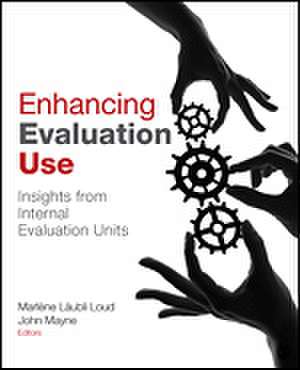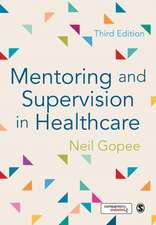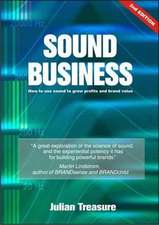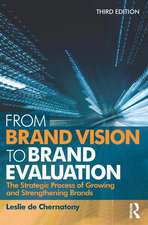Enhancing Evaluation Use: Insights from Internal Evaluation Units
Editat de Marlene Laubli Loud, John Mayneen Limba Engleză Paperback – 10 iun 2013
Preț: 558.71 lei
Preț vechi: 657.30 lei
-15% Nou
Puncte Express: 838
Preț estimativ în valută:
106.92€ • 110.95$ • 89.37£
106.92€ • 110.95$ • 89.37£
Carte tipărită la comandă
Livrare economică 15-29 martie
Preluare comenzi: 021 569.72.76
Specificații
ISBN-13: 9781452205472
ISBN-10: 1452205477
Pagini: 288
Ilustrații: Illustrations
Dimensiuni: 187 x 232 x 14 mm
Greutate: 0.5 kg
Ediția:First Edition
Editura: SAGE Publications
Colecția Sage Publications, Inc
Locul publicării:Thousand Oaks, United States
ISBN-10: 1452205477
Pagini: 288
Ilustrații: Illustrations
Dimensiuni: 187 x 232 x 14 mm
Greutate: 0.5 kg
Ediția:First Edition
Editura: SAGE Publications
Colecția Sage Publications, Inc
Locul publicării:Thousand Oaks, United States
Recenzii
This book is valuable to those involved in the evaluation of public organisations. Particularly insightful is the realization that similar challenges faced in various organizations are addressed with very different solutions.
"Overall, this is a good book that is neatly organized. The book can be used in teaching because the examples provide realistic flesh and blood to supplement new students’ learning of dry evaluation theory. Pedagogical discussion questions follow each chapter...Let me add that, as a reader, I feel reassured that the editors and authors collectively are experienced and competent."
"Overall, this is a good book that is neatly organized. The book can be used in teaching because the examples provide realistic flesh and blood to supplement new students’ learning of dry evaluation theory. Pedagogical discussion questions follow each chapter...Let me add that, as a reader, I feel reassured that the editors and authors collectively are experienced and competent."
Cuprins
Preface - Marlène Läubli Loud
1. Issues in Enhancing Evaluation Use - John Mayne
2. Evaluator, Evaluand, Evaluation Commissioner: A Tricky Triangle - Bastiaan de Laat
3. Evaluation Management: Lessons From New Zealand and International Development Evaluation - Penny Hawkins
4. Institutionalization and Evaluation Culture—Interplay Between the One and the Other: Lessons From the Swiss Federal Office of Public Health (FOPH) - Marlène Läubli Loud
5. Reshaping Evaluation to Enhance Utilization in Scotland: The Role of Intermediary Bodies in Knowledge-to-Action Strategies - Erica Wimbush
6. From Discrete Evaluations to a More Holistic Organizational Approach: The Case of the Public Health Agency of Canada - Nancy Porteous and Steve Montague
7. Evaluation Use Within the European Commission (EC): Lessons for the Evaluation Commissioner - Bastiaan de Laat and Kevin Williams
8. Evaluation Policy and Practice in a Changing Environment: Evolution of the Evaluation Function in the World Health Organization (WHO) - Maria Santamaria, Alan Schnur, and Deepak Thapa
9. Building for Utilization: The Case of the International Labour Organization (ILO) - Janet Neubecker, Matthew Ripley, and Craig Russon
10. What Can We Learn From Practitioners? Some Thoughts and Take-Home Messages for Internal Evaluation Units - Marlène Läubli Loud
Index
About the Editors
About the Contributors
1. Issues in Enhancing Evaluation Use - John Mayne
2. Evaluator, Evaluand, Evaluation Commissioner: A Tricky Triangle - Bastiaan de Laat
3. Evaluation Management: Lessons From New Zealand and International Development Evaluation - Penny Hawkins
4. Institutionalization and Evaluation Culture—Interplay Between the One and the Other: Lessons From the Swiss Federal Office of Public Health (FOPH) - Marlène Läubli Loud
5. Reshaping Evaluation to Enhance Utilization in Scotland: The Role of Intermediary Bodies in Knowledge-to-Action Strategies - Erica Wimbush
6. From Discrete Evaluations to a More Holistic Organizational Approach: The Case of the Public Health Agency of Canada - Nancy Porteous and Steve Montague
7. Evaluation Use Within the European Commission (EC): Lessons for the Evaluation Commissioner - Bastiaan de Laat and Kevin Williams
8. Evaluation Policy and Practice in a Changing Environment: Evolution of the Evaluation Function in the World Health Organization (WHO) - Maria Santamaria, Alan Schnur, and Deepak Thapa
9. Building for Utilization: The Case of the International Labour Organization (ILO) - Janet Neubecker, Matthew Ripley, and Craig Russon
10. What Can We Learn From Practitioners? Some Thoughts and Take-Home Messages for Internal Evaluation Units - Marlène Läubli Loud
Index
About the Editors
About the Contributors
Descriere
Written from the insider's perspective, this text helps organizations become more focused on using evaluation to improve policies, strategies, programming and delivery of public and communal services










